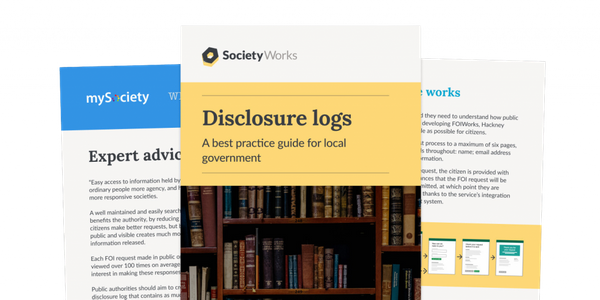Why disclosure logs are a must for local authorities (Guest blog by SocietyWorks)
The use of disclosure logs in relation to freedom of information (FOI) requests under the Freedom of Information Act 2000 is recommended for principal local authorities by the Information Commissioner's Office (ICO).
There are a number of reasons for this advice, the main one being because well-maintained disclosure logs make it much easier for citizens to access information that is already available. This, in turn, saves local authorities time and effort spent on responding to duplicate requests, or requests for information that have already been published elsewhere.
Short-term effort, long term advantages
With an easy to navigate disclosure log in place, citizens should be able to browse or search for already published information. If a request is made for information that already exists in the public realm, information officers can quickly apply the Section 21 exemption in response and simply signpost requesters to the information they seek.
Disclosure logs also represent an opportunity for citizens to learn what a successful request for information looks like. The more responses published in the log, the more useful it becomes, with today’s responses answering tomorrow’s requests.
In certain cases, some of the software used by local authorities may even allow information officers to manually enter topical information into the disclosure log in anticipation of potential future FOI requests, giving them the opportunity to work proactively and publish information before it is requested.
What’s stopping more local authorities from using disclosure logs?
In spite of being recommended by the ICO, and in spite of the usefulness they represent, research in 2019 by our parent charity, mySociety, shows the use of disclosure logs by local authorities is still inconsistent.
There is a distinct lack of established sector-wide process for setting up a disclosure log, technology is rarely designed to meet the needs of information officers or FOI requesters, and there is a huge disparity in inter-authority knowledge sharing and training around this topic.
Of course, local authorities are under significant pressure to reduce costs, create efficiencies and contribute towards Net Zero targets, among many other responsibilities. Understandably then, while the long term benefits for councils’ information officers and for citizens are desirable, the short term effort required to establish an easy-to-maintain disclosure log may be considered a relatively low priority.
However, with fifteen years’ experience working in freedom of information, and over a decade of experience providing services to the local government sector, we have seen firsthand how disclosure logs, when used to their full potential, can save significant time and effort for local authorities in the context of managing scarce resources and competing priorities.
Expert advice for local authorities
In collaboration with the FOI experts on mySociety's Transparency team, who run the well-used WhatDoTheyKnow request service, and expert FOI consultant Martin Rosenbaum, who was the BBC’s leading specialist in using freedom of information for journalistic purposes, we have put together a best practice guide to using disclosure logs for local authorities.
Download the guide to discover:
- Why, although not a legal requirement, using a disclosure log is a must for local authorities
- How to effectively set up and maintain a disclosure log
- Real world examples of councils using disclosure logs well and the positive impact they have
- Advice from FOI experts specifically for local authorities
Disclosure logs: a best practice guide for local authorities is free to download from the SocietyWorks website: https://www.societyworks.org/research-and-guidance/disclosure-logs-guide/?source=techuk

About SocietyWorks
SocietyWorks is a trusted provider of digital solutions and consultancy for local government and the public sector. We are owned by mySociety, the registered charity behind some of the UK’s most well-loved, open-source civic technology.
For more information, please visit www.societyworks.org. You can also follow us on LinkedIn and Twitter.



